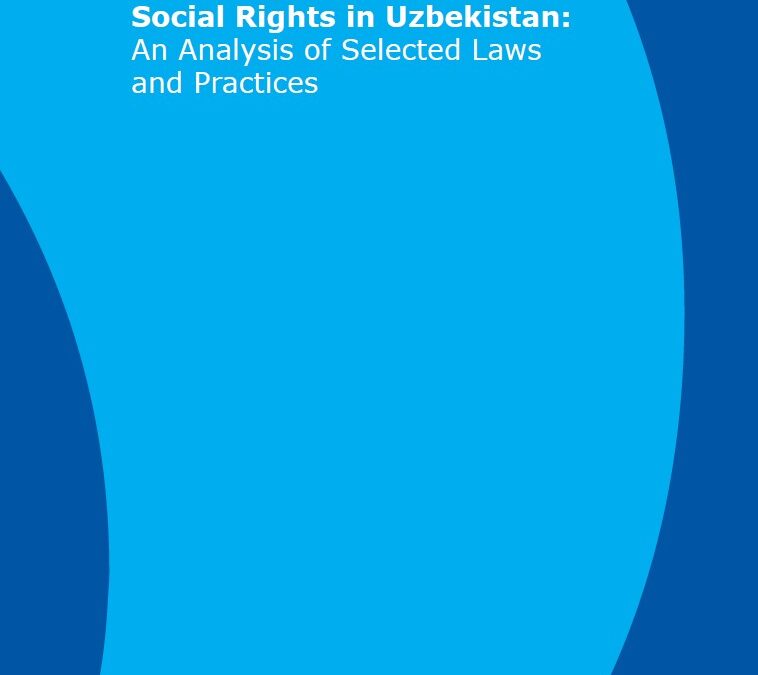
Mar 29, 2021 | News, Publications, Reports, Thematic reports, Uncategorized
The International Commission of Jurists (ICJ) has published a new report Accessing Economic and Social Rights in Uzbekistan: An Analysis of Selected Laws and Practices. In the report, it considers aspects of Uzbekistan’s implementation of its obligations to respect, protect and fulfil economic, social and cultural (ESC) rights through laws and policies as well as through access to justice and remedies for those who allege that their ESC rights have been violated.
Analysing the general legal framework for protection of these rights, the report considers in more detail particular challenges in Uzbekistan, in respect of the right to adequate housing, the right to health, and rights in the workplace.
In the report, the ICJ concludes that in-depth reforms of the justice system are still needed to ensure effective remedies for ESC rights violations in practice, including through genuine independence of the judiciary and regular application of international human rights law in and by the courts.
In general, the use of international law in the Uzbekistan justice system remains weak and underdeveloped. International law is to a high degree theoretical for most legal practitioners, an approach that appears to have its roots in legal tradition and culture, lack of political will and a lack of concrete programmes of measures to make progress in this regard. In practice, judges, prosecutors and lawyers continue not to be exposed to international law on ESC rights, and usually do not apply it in their work directly.
The report concludes that in Uzbekistan the justiciability of ESC rights is not always accepted, as some ESC rights are not seen as rights whose violation could or should be remedied through and by the courts. Rather, many actors see guarantees of non-discrimination or aspects of the right to health or education as benefits which are not of a justiciable nature. Lawyers, sharing a similar legal mindset and background, do not tend to demonstrate the necessary legal activism in pursuing judicial remedies in such cases.
The report contains five chapters. Chapter 1 of the report outlines the general issues which are essential to ensure access to justice for ESC rights in Uzbekistan. Chapter 2 is dedicated to issues related to the right to housing, its international legal aspects and national implementation. Chapter 3 discusses issues related to the right to health while Chapter 4 describes the aspects of the protection of the right to work internationally as well as in Uzbekistan. In Chapter 5, the report sets out conclusions and recommendations on access to justice as well as the measures to protect specific rights addressed in the report.
The publication of the report marks the conclusion of a three-year project, ACCESS, of the International Commission of Jurists (ICJ), which has worked to advance civil society engagement for the protection of ESC rights in Uzbekistan. It draws on several discussions in Uzbekistan, as well as on legal research carried out throughout the project.
Please see the report below:
In English: Accessing Economic and Social rights in Uzbekistan: an analysis of selected laws and practices
In Russian: Доступ к экономическим и социальным правам в Узбекистане: анализ законодательства и практики
In Uzbek: Ўзбекистонда иқтисодий ва ижтимоий ҳуқуқларни баҳолаш: айрим қонунлар ва амалиёт таҳлили
Please see the executive summaries below:
In English: Accessing Economic and Social rights in Uzbekistan: an analysis of selected laws and practices. Executive summary
In Russian: Доступ к экономическим и социальным правам в Узбекистане: анализ нормативно-правовых актов и практики. Резюме отчета.
In Uzbek: Ўзбекистонда иқтисодий ва ижтимоий ҳуқуқлардан фойдаланиш имкониятлари: алоҳида норматив-ҳуқуқий ҳужжатлар ва амалиёт таҳлили.Ҳисоботнинг қисқача мазмуни
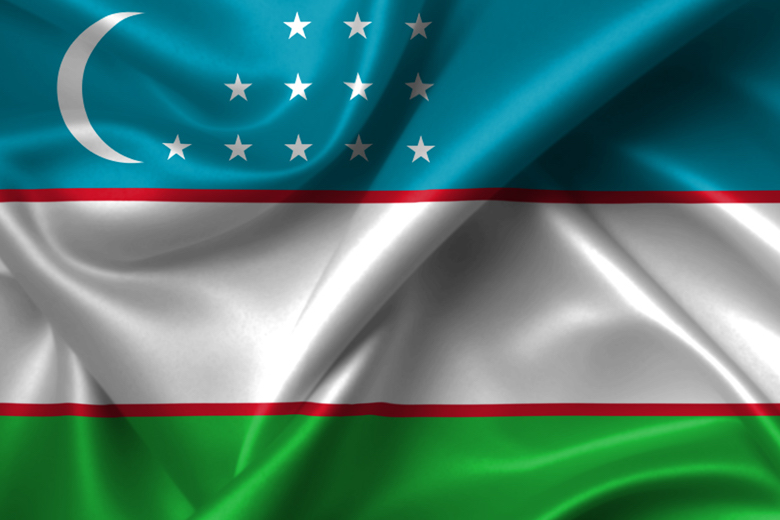
Mar 25, 2021 | Agendas, Events, News
Today, the ICJ, the Office of the High Commissioner for Human Rights (OHCHR) Regional Office for Central Asia (ROCA) and the Supreme School of Judges of the Republic of Uzbekistan (SSJ) are holding a final conference on the implementation of international law on economic, social and cultural rights in the national legal framework of Uzbekistan.
This is the final event of a three-year project “Advancing Civil Society in Promoting economic, social and cultural rights Standards” (ACCESS), implemented by the ICJ, funded by the European Union.
Participants will discuss the obstacles to the enjoyment of economic, social and cultural (ESC) rights in Uzbekistan and how to strengthen protection of these rights through access to justice and legal remedies. The discussions will aim to strengthen the implementation of international law on ESC rights, including rights to housing, healthcare and rights to equal protection in the workplace, and ensure that the justice system provides effective protection and remedies where they are violated.
The OHCHR for Central Asia, the SSJ, Tashkent State University of Law, the Nationwide Movement “Yuksalish,” national and international experts will participate in the final conference.
“This is a very important project, which was timely but also challenging to implement during the period of COVID-19 pandemic. The right time to raise awareness around economic, social and cultural rights in particular. This is about accompanying the important reforms of the Government of Uzbekistan, it is about promoting human rights and the rule of law, which is also an important part of our EU Central Asia Strategy,” said H.E. Charlotte Adriaen, Ambassador of the European Union to Uzbekistan.
Ryszard Komenda, Regional Representative of the UN Human Rights Office for Central Asia noted that “this project to promote economic, social and cultural rights in Uzbekistan was and remains highly relevant and needed, including for the dissemination of legal knowledge on human rights among lawyers and representatives of civil society. The implementation of this project during the period of ongoing reforms in the country and participation of UN experts from CEDAW and CRC, makes the project especially effective, unique and timely.”
“Uzbekistan has a solid legal basis to meet its obligations to protect economic, social and cultural rights. But to realize the law’s potential in practice, people whose rights are violated need effective access to the justice system, and the courts need to apply the rights set out in international law,” said Róisín Pillay, Director of the ICJ Europe and Centra Asia Programme.
“We are happy to share our recommendations designed to ensure that people’s economic and social rights, as guaranteed in international law, are protected in practice, including through the justice system. I look forward to discussions with national and international partners during our final event,” she added.
“This project is a clear example of international cooperation of the Supreme School of Judges, which is fully consistent with its priorities. Of course, the implementation of international law on economic, social and cultural rights at the national level in Uzbekistan is one of the most significant national priorities, which requires active interaction between State authorities, the academic and expert community, and of course cooperation with international organizations,” said Khadji-Murod Isakov, the Director of the Supreme School of Judges under the Supreme Judiciary Council of the Republic of Uzbekistan.
Agenda in English
Agenda in Russian
Compilation of papers in Uzbek, Russian and English: Realising economic, social and cultural rights-2021
Contacts:
Ms. Dilfuza Kurolova, ICJ Legal consultant, t: +998 90 9050099 ; e: dilfuza.kurolova(a)icj.org
Ms. Guljakhon Amanova, National Program Officer, Uzbekistan, Regional Office of the UN High Commissioner for Human Rights (OHCHR), e:gamanova@ohchr.org
Mr. Utkir Khalikov, Head of the international department The Supreme School of Judges under the Supreme Judicial council of the Republic of Uzbekistan for Central Asia, e: inter.dep.ssj@mail.ru
The Project is financed by the European Instrument for Democracy and Human Rights (EIDHR) Delegation of the European Union to the Republic of Uzbekistan
Watch the video
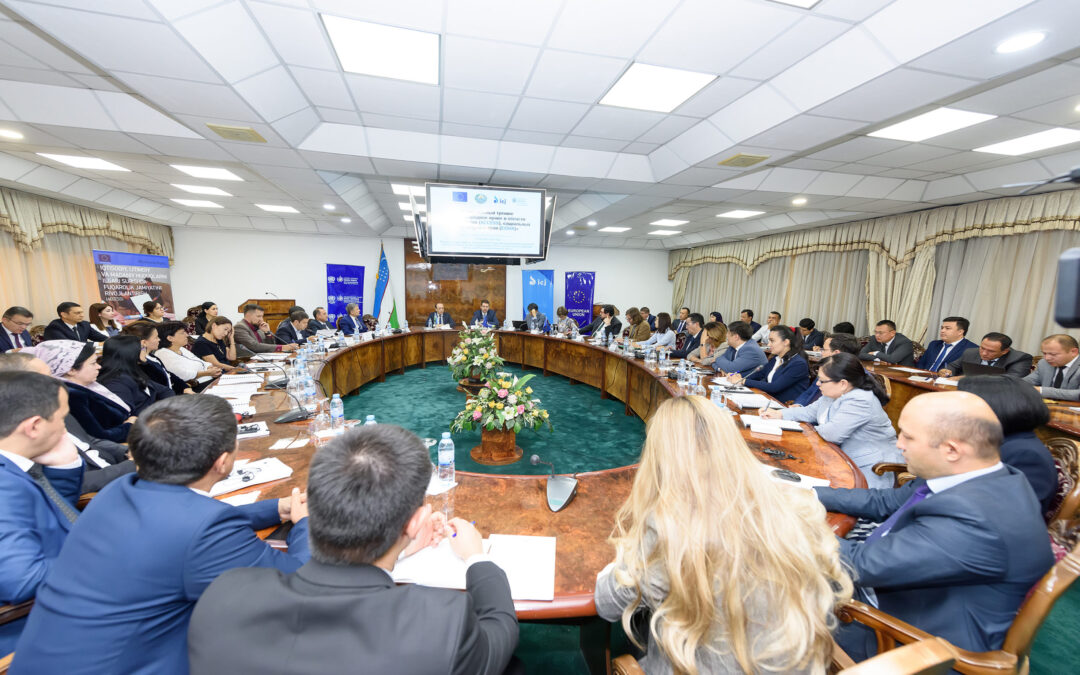
Oct 8, 2020 | News
Today, the ICJ, the Regional office of the UN High Commissioner for Human Rights (OHCHR) for Central Asia and the Supreme School of Judges of the Republic of Uzbekistan (SSJ) are beginning a national training on “International law on economic, social and cultural (ESC) rights.”
This two-day online-training is the second of a series of trainings on ESC rights, including, the right to health, education, housing, child protection and rights in the workplace.
The online-training aims to build the capacity of judges, lawyers, prosecutors, legal academics and other representatives of civil society to apply international law and standards on ESC rights. Trainers will share best practices on implementation by States of their international obligations, including through judicial practice, and in ensuring access to justice for ESC rights. The online-training will also allow for exchanges between members of the judiciary, other legal practitioners, and members of civil society.
The training will be based on four modules: (1) introduction to international law on ESC rights; (2) international obligations concerning access to justice and effective remedies for ESC rights in national courts and comparative examples of good practices; (3) children`s ESC rights and (4) women`s ESC rights. The office of the UN Special Rapporteur on independence of judges and lawyers and representatives of the UN Committee on the Elimination of Discrimination against Women will participate in the training.
“Nobody could imagine the challenges the world will face only in few months after my visit to Uzbekistan. We are witnessing and living this unprecedently challenge for individuals, societies and states to response to crisis at global and national level to protect right to life and health, and to protect individuals from impact of lockdowns and restrictions. Economic, social and cultural rights are the heart of these challenges,” said Diego Garcia-Sayan, the UN Special Rapporteur on independence of judges and lawyers in his video-address to the participants of the training.
Francois Begeot, Head of Cooperation of the Delegation of the European Union to the Republic of Uzbekistan pointed out, “COVID-19 pandemic showed the urgency and importance of economic, social and cultural rights that have to be ensured by the states, even in the emergency situations. Taking international obligations, Uzbekistan has to respect, protect and fulfil human rights including during the state of emergency and ensure access to justice and legal remedies.”
Read full press release here.
Watch Diego García-Sayán speech for the event:
Contact:
Ms. Dilfuza Kurolova, Legal Consultant, ICJ Europe and Central Asia Programme, e: dilfuza.kurolova@icj.org
Ms. Guljakhon Amanova, National Program Officer, Uzbekistan, Regional Office of the UN High Commissioner for Human Rights (OHCHR), e:gamanova@ohchr.org
Mr. Utkir Khalikov, Head of the international department The Supreme School of Judges under the Supreme Judicial council of the Republic of Uzbekistan for Central Asia, e: inter.dep.ssj@mail.ru
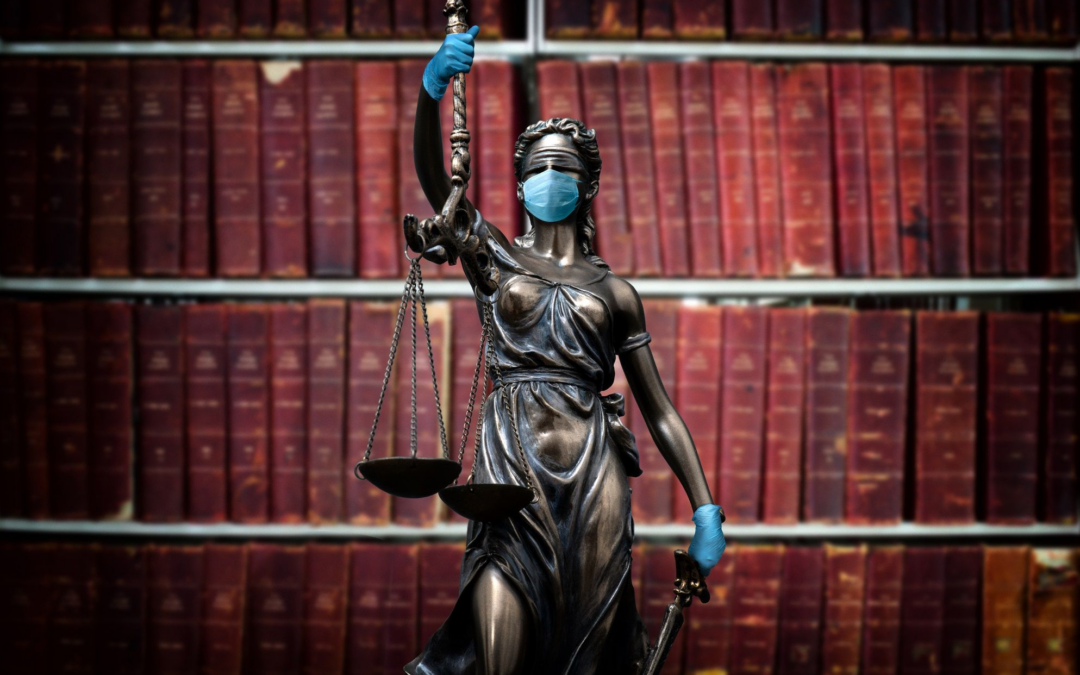
Jul 30, 2020 | Advocacy
The ICJ is concerned that in Kazakhstan, Kyrgyz Republic, Tajikistan and Uzbekistan the COVID-19 pandemic, and measures taken purportedly to contain it, have significantly curtailed access to justice. Restrictions have affected the operation of the courts and impeded lawyers’ ability to provide effective legal assistance to their clients.
In the context of the COVID-19 pandemic — whether under a state of emergency or not — States’ obligations under international human rights law to uphold the fundamental guarantees of a fair trial, and to ensure access to effective remedies for violations of human rights endure.
The right to a fair trial entails the right to adequate time and facilities to prepare a defense, which, in turn, requires the opportunity to communicate with one’s lawyer effectively and in confidence.
In light of this, the ICJ calls on Central Asian States to ensure that, while COVID-19 restrictions are in place, access to a lawyer continues to be ensured, and that measures be put in place so that lawyers are able to communicate with their clients safely, effectively and confidentially, including in places of detention or during online hearings.
In addition, wherever and whenever the authorities put in place restrictions on physical meetings or travel with the stated purpose of containing the COVID-19 pandemic, the ICJ calls on Central Asian States to ensure that access to court is guaranteed through specific legal, administrative and practical measures.
ICJ research and discussions with lawyers have shown that across Central Asia, regulations adopted during COVID-19 relating to the administration of justice have suffered from vague language, inconsistencies and unclear guidance.
In practice, this had serious implications for the right to fair trial of defendants: in some cases defence lawyers were not allowed to meet their clients who were charged with serious crimes; in other instances lawyer-client meetings were very short, undermining the ability of lawyers to take proper instructions from their clients and to advise them accordingly; in other cases defence lawyers met their clients in circumstances where the confidentiality of their communication was compromised as a result of the virtual communication platforms they were forced to use.
The restriction measures relating to the administration of justice that the authorities have imposed have also had negative consequences for access to justice and effective remedies for victims of human rights violations; notably, access to legal assistance in domestic violence cases was impeded across the region.
In many court buildings social distancing requirements were not adjusted in such a way as to uphold the right to a public hearing. There has been a lack of sufficient guidance on how the right to a public hearing may be ensured online, including as to how the right to equality of arms and the right to legal representation would be protected.
Download
Central Asia-Statement COVID-19-Advocacy 2020-ENG (full article with additional information, in PDF)
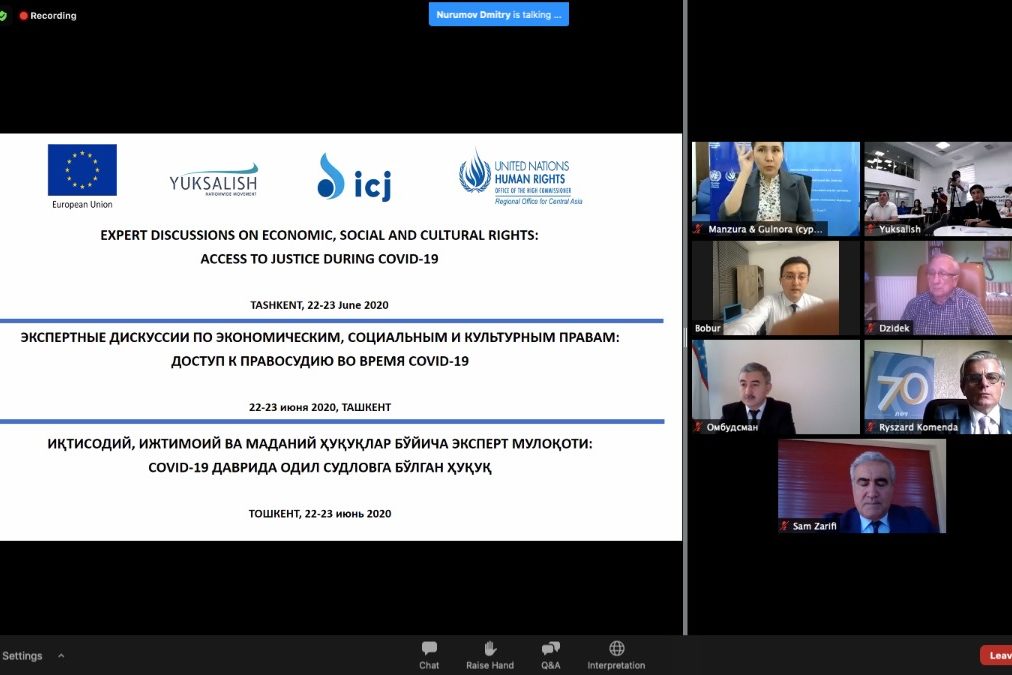
Jun 22, 2020 | News
Today, the ICJ, the Regional Office of the UN High Commissioner for Human Rights (OHCHR) for Central Asia and the Nationwide Movement “Yuksalish” are holding an Expert Discussion on the impact of COVID-19 on access to justice for economic, social and cultural rights (ESC rights) in Uzbekistan and comparative experiences from Europe and Central Asia.
The Fifth Expert Discussion, Access to justice in times of COVID-19, will address issues including access to a lawyer and access to court.
The event will present an opportunity to national and international experts, including lawyers, judges, members of UN human rights bodies, civil society, and other experts to debate questions of fundamental importance for ensuring access to justice and the protection of human rights in Uzbekistan.
“The COVID-19 pandemic has put new challenges before justice institutions around the world, including in Uzbekistan. These measures affected access to lawyers and courts judiciary therefore impeding full access to justice. This event will present an opportunity to discuss the solutions of States from around the globe about their responses to the pandemic. We believe that sharing experience among judges, lawyers and international experts from around the world will enrich the National debate and give an impulse for further development and the independence of the judiciary in Uzbekistan” said Akmal Burkhanov, Chairperson of the Nationwide movement “Yuksalish”.
“The pandemic became the so-called “maturity test” for the justice system and many of the urgent issues should be resolved in the light of the anti-COVID-19 measures taken. Therefore, I would also see the pandemic as an opportunity. The opportunity for transforming, changing for the better the functioning of traditional courts, provided that a high quality of justice and respect for individual rights are at the forefront of all changes,” pointed Eduards Stiprais, EU Ambassador to Uzbekistan.
Ryszard Komenda, Regional Representative of the UN Office for Human Rights for Central Asia quoted the UN High Commissioner for Human Rights, Michelle Bachelet, who stated that “in order to cope effectively with the pandemic states may need to introduce certain restrictions on the exercise of certain human rights, however, such restrictions need to be necessary, proportionate, and non-discriminatory”. Mr. Komenda noted that “the impact of the regulations on lockdown affected the day-to-day work of courts and lawyers. From the perspective of international human rights standards, it is crucial that the right of individuals to an operative and independent judicial system, in particular the right to an effective remedy, habeas corpus guarantees and access to a lawyer of one’s choosing are strictly adhered to”.
“Our fifth Expert Discussion on economic and social rights, is devoted to addressing the major problems people have in getting access to justice and defending their rights during the global COVID-19 pandemic,” said Sam Zarifi, the ICJ Secretary General.
“The ICJ has documented how around the world the pandemic has severely affected peoples’ right to health, to food, to water, to education and to sanitation, and we have also seen the additional difficulties facing people with lower income and access to the levers of power.”
“We aim to discuss how international law and national best practices can help the judiciary and legal system alleviate some of the human rights issues arising from Covid-19 in Uzbekistan, and maybe even build a more responsive and accountable system after the pandemic.”
Background:
The Expert Discussions on ESC rights aim to raise awareness about the implementation of international law and standards on ESC rights by the national justice system, to facilitate access to justice in relation to ESC rights and promote effective use of international law on ESC rights at the national level. Each Expert Discussion is attended by international and national experts.
The first discussion was held in September 2018 on international standards in labour rights. The second meeting, held in December 2018, concerned judicial application of the principle of non-discrimination; the third meeting, held in March 2019, was dedicated to the rights of people with disabilities, and the forth meeting, held in October 2020, discussed the right to adequate housing in Uzbekistan.
Uzbekistan ratified the International Covenant on Economic, Social and Cultural Rights (ICESCR) in 1995.
The Expert Discussions are organized by the ICJ within the framework of the “Advancing Civil Society in Promoting economic, social and cultural rights (ESCR) Standards in Uzbekistan (ACCESS)” Project funded by the EU through the European Instrument for Democracy and Human Rights (EIDHR).
Contact:
Dilfuza Kurolova, ICJ Legal consultant, t: +998 90 9050099 ; e: dilfuza.kurolova(a)icj.org
Agenda:
English version
Russian version
Uzbek version









